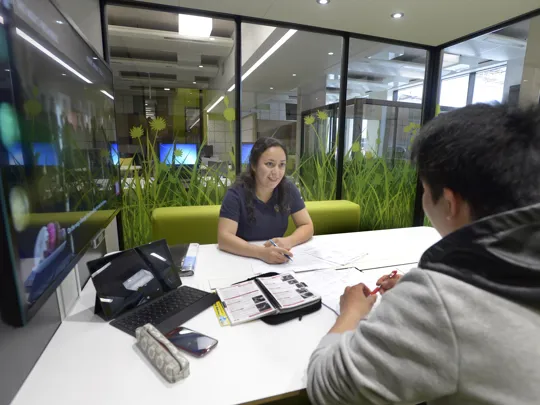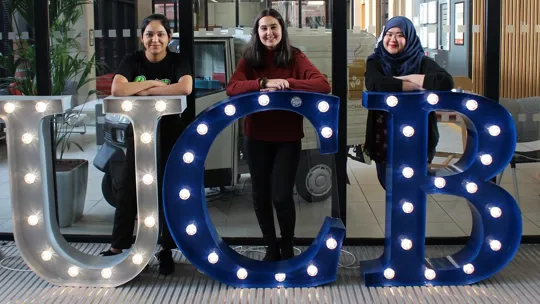Exploring course structure and learning opportunities
Within your course, there are different ways in which content is delivered and different ways that you can explore ideas or concepts in depth in your own time through independent learning. Here, we give a brief outline of course structure, an overview of learning opportunities and some key points to note.

Course structure
All HE courses are composed of a number of different modules. Each time you begin a new module, you will have access to the Definitive Document through Canvas, our Virtual Learning Environment. This document gives a module description, an overview of its content, the learning outcomes and assessment methods.
Through Canvas you will also have access to your reading list. The document gives details of your teaching team, a week-by-week breakdown of the topics covered, and appropriate reading, with direct links to online materials.
Lectures
Lectures will form a key part of module delivery. They may explain some of the key theories and topics for a particular subject or give a broad outline of a topic area. They will include a mix of delivery from the lecturer and student engagement/activity. They are an important means by which you are taught about the area of your study. The teaching team will deliver lectures or, occasionally, a guest lecturer who will give particular insight into an area of your study.
Achieving the learning outcomes depends on your reading, seminar contributions, assignment completion and, where necessary, attendance at workshops or the Centre for Academic Skills and English (CASE). Directed reading is given with every lecture.
We encourage you to take notes during lectures using a method that suits you. This may be done by hand or using a laptop or tablet. Note-taking is an important skill that should be further developed over the years of study. Help on note-taking can be obtained from the CASE.
Guest lectures
Throughout the year, a range of guest lectures will take place. Guest lectures offer a great opportunity to help contextualise a particular course or subject or explore an issue in more depth. They can also often provide insight into the day-to-day operational issues which managers must deal with.
Guests may sometimes be brought in on a specific module to discuss a particular topic. Alternatively, a guest lecture may have a more general theme as its subject. This second type of guest lecture will be open to all students and usually takes place on a Wednesday afternoon.
Seminars
Seminars are a key opportunity for you to explore and clarify concepts and theories raised in lectures. They give you the chance to ask questions and discuss issues in smaller groups, whilst honing your own communication and debating skills.
Seminars differ in style according to the module studied, or the level. They may be based on discussion, problem-solving or exercises to develop your understanding. You are often expected to take the lead in seminar discussions and can sometimes be assessed in them.
The nature of seminars means that they are often more interactive than lectures, being very dependent on the amount of preparation and work that you put in. Taking notes of the discussion, while sometimes difficult, is of critical importance, as many of the issues raised in seminars can later be useful for revision.
Team Work
You will sometimes be expected to work in a team with your colleagues. Team work is essential for delivering on an event, for example, or in managing a client project or delivering restaurant service. Team work develops your skills around communication, time management and enquiry.
We recognise that at times, team work can be a challenge. Whilst recognising that team work can be a challenge, your assessment will not be negatively impacted. University College Birmingham's approach to team assessment is that you will be assessed individually.
Rules of conduct for lectures and seminars
Timekeeping
You are expected to arrive promptly for lectures and seminars. This is for the benefit of all students, as latecomers can be disruptive for the group. If you are having any issues that affect your attendance, please speak to your tutor.
Attendance and missing lectures
All students’ attendance is monitored. The expectation is for you to attend all lectures and seminars as this will help to ensure you will succeed and demonstrates your commitment to the course. If you have a poor attendance record, which is not the result of extenuating circumstances, this could affect your progression if it coincides with poor assessment performance. If you have missed a number of lectures, speak to your tutor about any concerns or to ensure you are getting the right support to enable you to succeed.
Fitness to practice
Some courses are designated by the Academic Board as being subject to Fitness to Practice requirements. These support the promotion of the standards and ethics of relevant professional bodies, and students on these courses must sign the relevant code of professional conduct and fitness to practice.
More information is provided within the General Student Regulations, and details are available from the relevant course team, the UCB Registry and the Codes of Professional Conduct, which can be found on the University College Birmingham Policies and Regulations page.
Discover more

Plagiarism
Arising where work submitted by a student is not their own, but has been taken from another source.
Read more
Work Placements
Placements are administered by a team of Employability Tutors based within hired@UCB on the Ground Floor of the Moss House Campus.
Read more
Changing your course
Every year, some students decide that they wish to change their programme of study, and move either to another programme within University College Birmingham.
Read more
Health and Safety Regulations
Our policy is to take all reasonable and practicable steps to provide and maintain safe and healthy working conditions.
Read more
Equal Opportunities Policy
The aim of the Policy is to ensure that all students, employees, applicants and all those involved in its work, and other users of University College Birmingham fac…
Read more
Computer Misuse Policy
All access of computers and connected systems is governed by the Computer Misuse Act 1990. This act has created three criminal offences covering the usage of computers.
Read more
Open days
Come and visit us on one of our open days, where you can find out more about our courses, our facilities and speak to current students and staff.
Read more
Contact us
There are many ways you can contact University College Birmingham, from phone and email to social media.
Read more